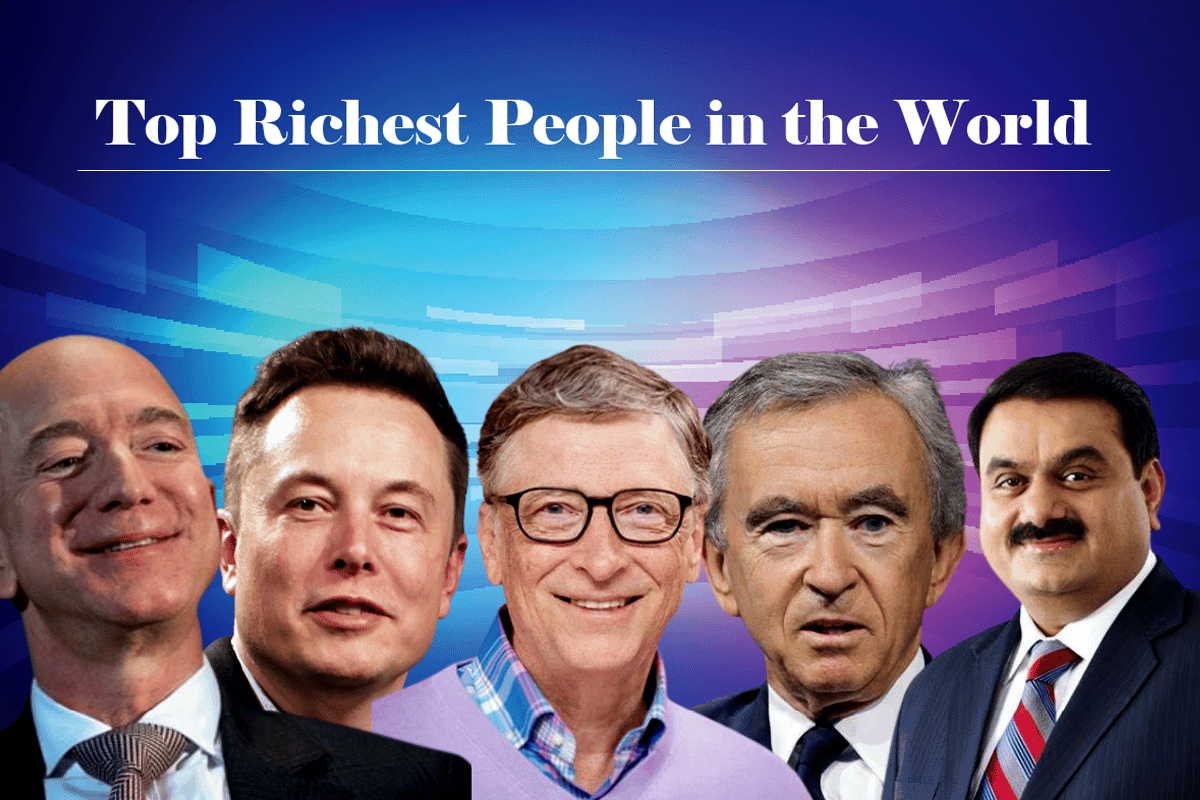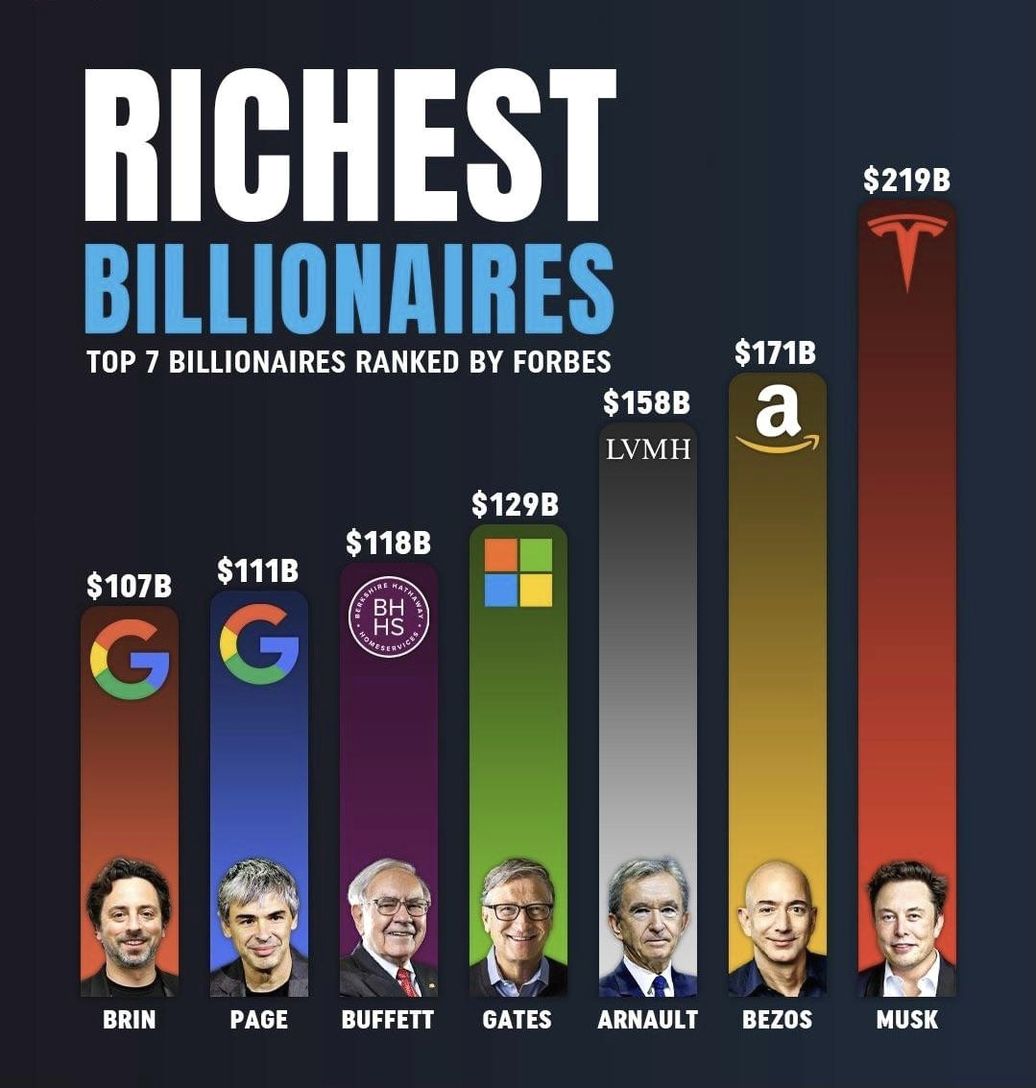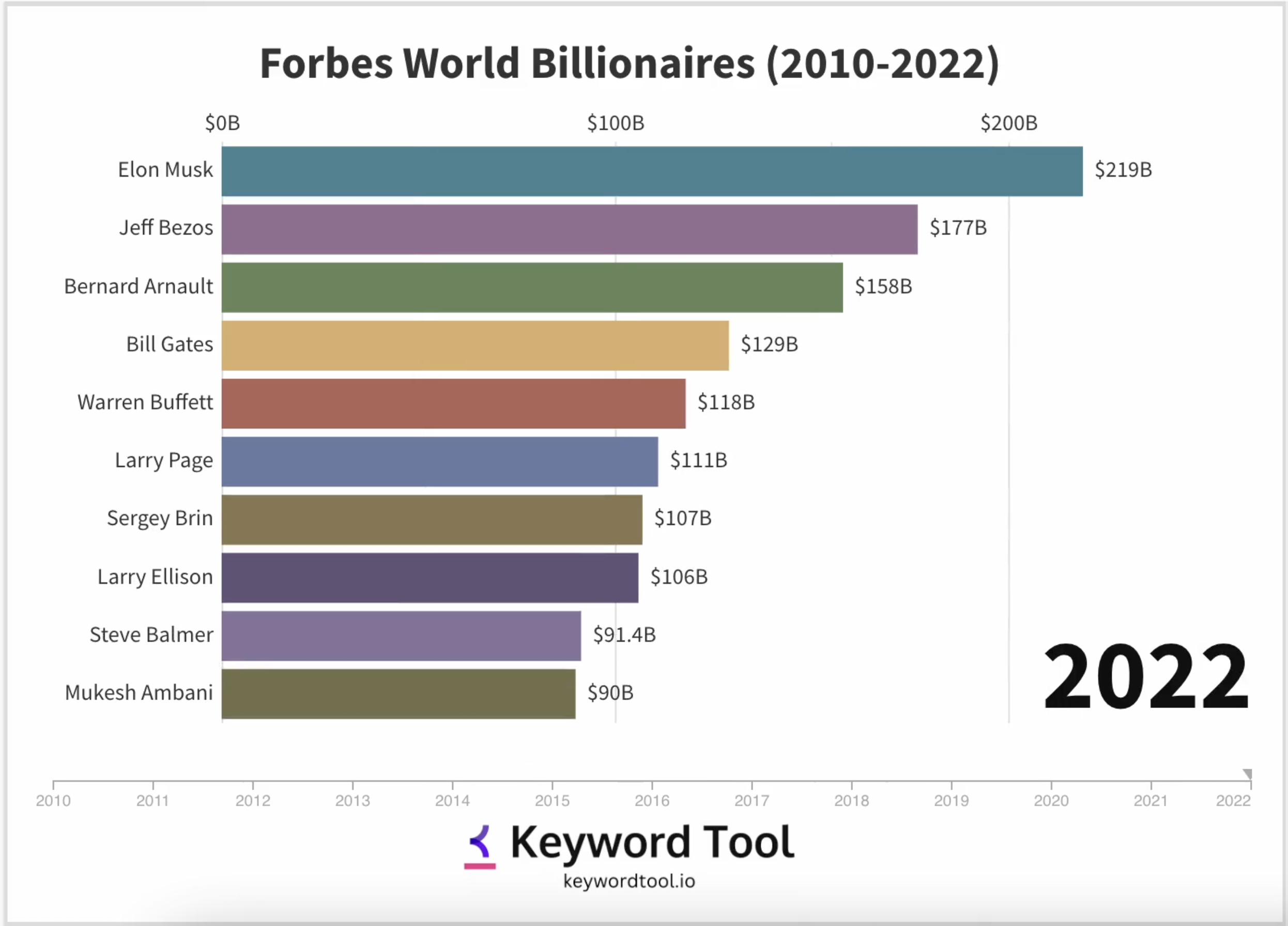Have you ever stopped to consider what truly immense wealth looks like? When we talk about the richest people today, names like Elon Musk or Alice Walton often come to mind, and for very good reason. Our modern world, you know, has billionaires whose fortunes stretch into the hundreds of billions of dollars, like Elon Musk with his estimated $342 billion, or Alice Walton, the richest woman, worth around $107 billion as of July 1, 2025, according to the latest information. It's truly a staggering amount of money, isn't it?
But what if we looked back, way back through the annals of time? What if we tried to put the wealth of ancient kings, powerful emperors, or even industrial titans from centuries past into today's dollars? It's a bit of a fascinating puzzle, actually, trying to compare apples and oranges, or rather, gold and land to tech stocks and digital assets. The sheer scale of wealth changes, and so too does how we measure it.
This article, you see, is all about taking that historical journey. We're going to explore some of the individuals believed to be the wealthiest people in history, and we'll try to get a sense of their incredible fortunes when adjusted for inflation, giving us a clearer picture of their economic power in a way we can grasp today.
Table of Contents
- The Challenge of Measuring Historical Wealth
- Who Were the Richest People in History?
- Mansa Musa: The King of Gold
- John D. Rockefeller: Oil Baron of Unprecedented Scale
- Andrew Carnegie: Steel and Philanthropy
- Augustus Caesar: Master of an Empire
- Jakob Fugger: The Renaissance Financier
- Genghis Khan: Conqueror and Wealth Accumulator
- William the Conqueror: Architect of English Wealth
- How Do They Compare to Today's Billionaires?
- The Ever-Changing Nature of Wealth
- Frequently Asked Questions
The Challenge of Measuring Historical Wealth
Figuring out who was truly the richest person ever is a bit more complicated than just checking a current list, you know, like the Forbes 2025 world's billionaires list that tracks fortunes as of March 7, 2025. Today, we have sophisticated financial markets, clear asset valuations, and pretty standard ways of measuring net worth. But go back a few centuries, and things get, well, a little hazy. It's almost like trying to count grains of sand on a very large beach.
Why "Adjusted for Inflation" Matters
When we talk about wealth from, say, the 14th century or even the Roman Empire, a simple numerical value just doesn't cut it. A million dollars in 1920 had far more purchasing power than a million dollars today, right? So, to make meaningful comparisons, we have to adjust for inflation. This means trying to figure out what a certain amount of wealth back then would be worth in today's money, considering the change in prices and the overall economy. It's a bit like translating an old language into a modern one, you know, to really grasp its meaning.
The challenge, however, is that inflation isn't just about consumer prices. It also involves the relative size of economies, the types of assets that existed, and how wealth was stored and used. For instance, in many historical periods, land was the primary source of wealth and power, whereas today, it's often technology, intellectual property, or vast financial holdings. So, adjusting for inflation is more than just a simple calculation; it's an attempt to put historical economic influence into a modern context, which is that, a very complex task.
Different Ways to Value Wealth Through Time
Historians and economists use various methods to estimate historical fortunes, and these methods vary quite a bit, you know. Sometimes, they look at a person's share of their country's or empire's GDP at the time. If someone owned, say, 10% of the entire economy, that gives a pretty good sense of their relative wealth, even if the absolute numbers are small by today's standards. Other times, they try to estimate the value of assets like land, gold, or commodities in current market terms. It's a tricky business, and honestly, all figures are estimates, but they give us a pretty good idea, in some respects.
For example, when Forbes compiles its current lists, like the 2024 Forbes list of the 200 richest people, information is typically as of March 8, 2024, or September 1, 2024, for the Forbes 400 richest Americans. They look at net worth, age, country of residence, and source of wealth, you know, with a very detailed methodology. But for someone like Mansa Musa, there's no such precise ledger. We're talking about educated guesses based on historical accounts and economic models, which is a very different kind of analysis.
Who Were the Richest People in History?
Now, let's get to the truly fascinating part: meeting some of the historical figures whose wealth, when adjusted, makes today's billionaires seem, well, a little less grand. These individuals weren't just rich; they controlled vast portions of their world's economies, and their influence, honestly, was absolutely immense.
Mansa Musa: The King of Gold
Mansa Musa, who ruled the Malian Empire in the 14th century, is often cited as the wealthiest person in history, and for good reason. His empire, you know, was the world's largest producer of gold at a time when gold was in incredibly high demand. It's said that during his pilgrimage to Mecca, he traveled with a caravan so vast, carrying so much gold, that he actually caused inflation in the cities he passed through, like Cairo. Imagine that kind of economic impact, you know, just by traveling!
Estimates of his wealth are, to be honest, difficult to pin down precisely, but many historians agree it was "unfathomable." Some suggest his fortune would be equivalent to somewhere around $400 billion or even more in today's dollars. This wasn't just personal wealth; it was control over an entire empire's resources, which is a slightly different concept than individual net worth today, but still, it was immense.
John D. Rockefeller: Oil Baron of Unprecedented Scale
Moving forward to the industrial age, we find John D. Rockefeller, the founder of Standard Oil. He pretty much revolutionized the oil industry in the late 19th and early 20th centuries. By the time he retired, his personal fortune was so vast that it represented a significant percentage of the entire U.S. economy, which was already, you know, becoming the world's largest.
At his peak, his net worth was estimated to be around $1.5 billion in 1918. When adjusted for inflation, considering his share of the U.S. GDP, his wealth could easily be estimated at over $300 billion, perhaps even reaching $400 billion in today's terms. He basically had a monopoly on oil, and that, you know, was an incredible source of wealth.
Andrew Carnegie: Steel and Philanthropy
Another titan of the Gilded Age, Andrew Carnegie, made his fortune in the steel industry. He built Carnegie Steel Company into an industrial powerhouse, and then, you know, he sold it to J.P. Morgan in 1901 for a truly astonishing $480 million. That single transaction, in its time, was absolutely massive.
When we adjust his fortune for inflation, his wealth is often estimated to be around $310 billion to $370 billion in today's money. What's also remarkable about Carnegie is that he gave away nearly all of his fortune to charities, foundations, and universities, which is a rather inspiring legacy, you know, beyond just the money itself.
Augustus Caesar: Master of an Empire
Stepping even further back in time, Augustus Caesar, the first Roman Emperor, wasn't just a ruler; he was, in a way, the personal owner of the largest empire of his time. He controlled Egypt, which was basically the breadbasket of the Roman world, and his personal wealth was tied directly to the vast resources and revenues of the entire Roman Empire.
Historians suggest that his personal wealth might have amounted to about 20% of the entire Roman Empire's economy. When you translate that to a modern equivalent, considering the sheer size and output of the Roman economy, his fortune could potentially be in the trillions of dollars. Some estimates put it as high as $4.6 trillion in today's money, which is, honestly, an almost unimaginable sum, even for today's standards.
Jakob Fugger: The Renaissance Financier
Jakob Fugger "the Rich" was a German merchant, mining entrepreneur, and banker during the Renaissance. He basically created a financial empire that spanned across Europe, lending money to popes, emperors, and kings. He funded the Habsburg dynasty's rise to power and pretty much controlled much of the European copper and silver trade.
At his peak, his wealth was estimated to be around 2% of Europe's total economic output, which, you know, was a very significant chunk. When adjusted for inflation and economic scale, his fortune is often placed in the range of $200 billion to $400 billion in today's terms. He was, in a way, the original venture capitalist, and his influence was immense.
Genghis Khan: Conqueror and Wealth Accumulator
Genghis Khan, the founder of the Mongol Empire, controlled the largest contiguous empire in history. While he didn't accumulate wealth in the traditional sense of gold piles or bank accounts, his wealth was in the form of land, resources, and the spoils of conquest. He pretty much owned everything within his vast domain, and his soldiers, you know, were his personal army.
It's difficult to put a precise number on his wealth, as it wasn't liquid in any modern sense. However, if you consider his control over vast swathes of land, populations, and trade routes, his economic power was, arguably, unparalleled. Some analyses suggest that if his control over land and resources were monetized, his fortune could easily be in the hundreds of billions, possibly even trillions, making him one of the wealthiest individuals by command of resources.
William the Conqueror: Architect of English Wealth
William the Conqueror, after his successful invasion of England in 1066, basically took control of the entire country. He didn't just rule it; he owned it. The Domesday Book, a comprehensive survey of England commissioned by William, essentially documented every piece of land, every resource, and every person, all for the purpose of taxation and consolidating his control.
His wealth was, in essence, the entire kingdom of England. While specific monetary figures are hard to come by, his control over the land, its resources, and its people meant his economic power was absolute. When adjusted for the relative size of the English economy at the time and its modern equivalent, his fortune would be considered in the hundreds of billions of dollars, or even more, making him a truly formidable figure in terms of historical wealth.
How Do They Compare to Today's Billionaires?
When we look at the figures for these historical giants, it's pretty clear that many of them, when adjusted for inflation and their relative economic power, dwarf even today's wealthiest individuals. For instance, Elon Musk, as of March 7, 2025, is worth an estimated $342 billion, which is, you know, an incredible sum. Alice Walton, the richest woman, is worth about $107 billion as of July 1, 2025. These are truly massive fortunes, by any modern measure.
However, when you consider someone like Mansa Musa, with estimates reaching $400 billion or more, or Augustus Caesar, potentially in the trillions, it really puts things into perspective. Today, we have a record 3,028 billionaires on this year’s ranking, worth a record $16.1 trillion combined, according to my text. But even that combined sum is sometimes matched or exceeded by the estimated wealth of a single historical figure like Augustus, who basically controlled an entire empire's economy. It shows, you know, just how different wealth accumulation was in different eras.
The 15 centibillionaires (people with over $100 billion) listed in my text are worth $2.4 trillion combined, which is more than the bottom 1,500 billionaires combined. That's a huge concentration of wealth, no doubt. But the historical figures we've discussed often commanded a much larger *percentage* of the world's or their empire's total economic output, which is a very key distinction. Their wealth wasn't just personal; it was often tied to the very fabric of their societies and economies, which is a pretty powerful thing to think about.
The Ever-Changing Nature of Wealth
The story of the richest people in history, when adjusted for inflation, tells us a lot about how wealth itself has transformed over time. In ancient and medieval times, wealth was primarily about land, resources, and military might. If you controlled vast territories, you controlled the people, the agriculture, and the raw materials, which was, you know, pretty much everything.
Then came the age of trade and finance, with figures like Jakob Fugger showing how banking and commerce could create immense fortunes. The Industrial Revolution shifted the focus to manufacturing, railroads, and, of course, oil, creating titans like Rockefeller and Carnegie. And today, we see wealth largely driven by technology, innovation, and global markets. The source of wealth, you know, constantly evolves, reflecting the changing priorities and structures of human society.
So, while the names and the specific numbers change, the pursuit of wealth, and the incredible impact it can have, remains a constant thread throughout human history. It's truly fascinating to see how fortunes, whether in gold, land, steel, or software, have shaped our world, and how, in a way, they continue to do so.
Frequently Asked Questions
Here are some common questions people often ask about the wealthiest individuals from history:
Who was the wealthiest person in all of history?
While exact figures are challenging to confirm, Mansa Musa, the 14th-century ruler of the Malian Empire, is widely considered the wealthiest person in history when his fortune is adjusted for inflation. His empire controlled vast gold and salt reserves, giving him immense economic power.
How is historical wealth adjusted for inflation?
Adjusting historical wealth for inflation involves more than just a simple calculation. Historians and economists use various methods, including estimating a person's wealth as a percentage of their contemporary economy's GDP, or valuing their assets (like land or gold) in current market terms. It's a complex process because economies and the nature of wealth have changed dramatically over centuries. You can learn more about how economists measure historical economic data.
Was John D. Rockefeller the richest person ever?
John D. Rockefeller was certainly one of the richest people in modern history, especially during the Industrial Age. His fortune, when adjusted for inflation, often places him among the top historical figures, with estimates sometimes exceeding $300 billion in today's dollars. However, historical figures like Mansa Musa and Augustus Caesar are often considered to have held even greater wealth, relative to their times, due to their direct control over entire empires' resources. You can learn more about wealth measurement on our site, and also explore more about the world's richest people.



Detail Author:
- Name : Lucious Casper MD
- Username : heathcote.kurt
- Email : trippin@gmail.com
- Birthdate : 2001-03-24
- Address : 473 Rowe Locks Port Wayne, TX 88991
- Phone : +1-585-229-7322
- Company : Moore Inc
- Job : Chemical Plant Operator
- Bio : Laborum animi beatae eaque. Dolor ut possimus ex neque. Nesciunt blanditiis nihil illum molestias a. Hic et ea et qui soluta dignissimos.
Socials
instagram:
- url : https://instagram.com/corbin_dev
- username : corbin_dev
- bio : Quas et et ut totam blanditiis. Quibusdam expedita quis architecto modi et fugiat ducimus.
- followers : 4318
- following : 1441
linkedin:
- url : https://linkedin.com/in/corbin8572
- username : corbin8572
- bio : Magnam tempora est voluptas rerum optio.
- followers : 2222
- following : 2194